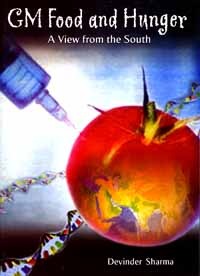:
 Genetically modified food has often been advertised and promoted as a way of providing consumers with a greater choice of food as well as a possible way
to solve global problems of hunger and food shortages. Unfortunately, what is being conveniently overlooked is the fact that hunger and malnutrition
exist not due to lack of production but due to lack of access and distribution. The paradox of plenty and surplus at a time when millions starve, is a valid pointer to the flawed policies.
Genetically modified food has often been advertised and promoted as a way of providing consumers with a greater choice of food as well as a possible way
to solve global problems of hunger and food shortages. Unfortunately, what is being conveniently overlooked is the fact that hunger and malnutrition
exist not due to lack of production but due to lack of access and distribution. The paradox of plenty and surplus at a time when millions starve, is a valid pointer to the flawed policies.
Devinder Sharma's articles have questioned the view promoted by the producers of genetically engineered products, that future of agriculture and food security lies with biotechnology. His reports, often expressed in poignant terms, have examined in depth, the policy approaches to alleviating hunger and the governance of trade policies in the agricultural sector. Through his work, he strives to achieve significant improvement to food security in the south east asian region and ecologically sustainable development solutions.
GM technology cannot make food at a cheaper cost. In fact, all indicators point towards still higher prices for food in the coming years. Biotechnology, in essence genetic engineering, therefore is not the answer to hunger. Like the Green Revolution, which bypassed the small and marginal farmers, the misplaced 'gene revolution' will bypass the hungry. And that would be mankind's greatest folly.
Devinder Sharma is a distinguished journalist, author, thinker and analyst based in New Delhi, India. Trained as an agricultural scientist, Sharma has been with the Indian Express and Visiting Fellow to the International Rice Research Institute, in the Philippines, at the School of Development Studies, University of East Anglia, Norwich (UK) and the University of Cambridge (UK). He is a prolific writer and commentator on free trade and agriculture, biodiversity and patenting, genetic engineering and corporate control, and its implications for food security and the survival of the farming communities. Passionately involved in fighting hunger, he continues to be one of the strongest voices for judicious international and national policies that actually does not acerbate the crisis in hunger and malnutrition. Widely travelled and honoured, he chairs the New Delhi-collective Forum for Biotechnology & Food Security.
Among his recent works include two books GATT to WTO: Seeds of Despair and In the Famine Trap.























